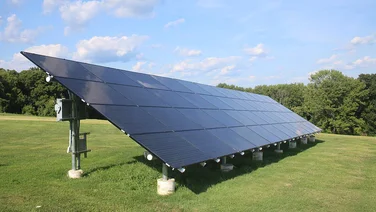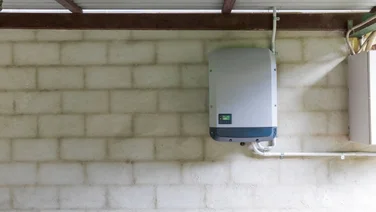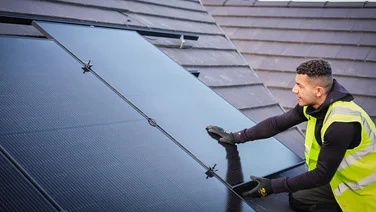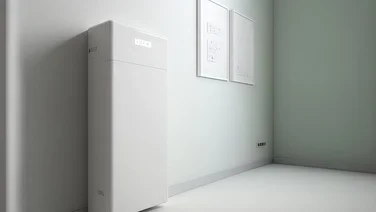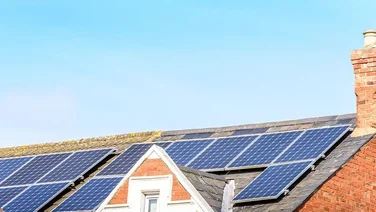We receive a small fee from trusted installers when you request a quote through our site. This helps us keep our content independent, well-researched and up to date – Learn more
✔ Tilly has an 18-panel, 6 kW solar panel system, and a solar battery
✔ She hardly ever uses electricity from the grid now
✔ The whole system cost her £8,453, including installation
We spoke with Tilly Casson, who took advantage of falling solar panel prices to get a system installed at her home in Farnham, Surrey less than a year ago.
Here’s what she had to say.
Where do you want to install solar panels?
Get started
Tilly has an 18-panel, 6 kW solar panel system, and a solar battery
Q: How long have you had your solar panels?
A: “We had our solar panels installed in November 2021.”
Q: Why did you decide to get solar panels?
A: “With the rising costs of electricity, we could see it was going to become very expensive to continue relying on the grid — especially since average prices per kilowatt hour reached 28p.
“Getting solar panels felt like the best option to avoid the big price hikes. Also to become energy independent, have our own energy source, and to help the planet.”
Q: Are you pleased you bought solar panels?
“Yes, very pleased — I can confidently say solar panels have delivered on their promise and more! We now get almost 100% of power from solar panels, which has been a massive benefit.”
Q: How big is your solar panel system, and how roughly much did it cost?
A: “We have an 18-panel system plus battery (sorry, I can’t remember the exact capacity for the battery). The system is 6 kW and it cost us £8,453 including installation.”
Want to learn more about the price of solar panels? Head to our solar panel cost page.
Where do you want to install solar panels?
Get startedQ: What was the experience like buying the panels?
A: “The whole experience of getting the solar panels was absolutely painless. The Solar Together initiative run by the council really helped with everything.
“First, they did the due diligence with a survey on our home, then they sent an engineer to take a look, who then gave us a quote. After that, installation was booked and the whole process took just two days.”
You can read more on Solar Together here or check out our article on solar panels in Essex, where we cover the region’s Solar Together scheme.
Q: Do you have a solar battery?
A: “Yes, we have a solar battery, and we use it to power our appliances at night. It’ll usually last throughout the night, depending on what we’re using of course.”

Tilly’s solar storage battery
Q: Do your solar panels generate enough power to cover all your electricity needs? How often do you rely on the grid for electricity?
A: “When it’s sunny, we don’t need to use electricity from the grid at all. We feed a lot of electricity back into the grid, but we’re not a part of the Smart Export Guarantee (SEG).
“We only fall back on the grid when the weather is particularly bad and/or our solar battery doesn’t have enough power stored. This is rare, though.
“One thing I would add is that we regret getting a smart meter — at the moment there seems to be zero benefit to owning one. We also miss being able to see our old meters go backwards thanks to the electricity generated by our solar panels!”
Q: How much money do your solar panels save you on your electricity bills?
A: “I would say on a daily basis we are hardly using grid electricity. Every day it’s sunny, it’s basically free, but it’s hard to know exactly.
“I must add as well, we’ve had problems with EDF, who insisted we had a smart meter. In hindsight I wish I’d taken my daughter’s advice and gone with Octopus instead.”
Q: Are you receiving money via the Smart Export Guarantee?
A: “No, we’re not. Our DNO (Distribution Network Operator) is not responding to me, so at the moment we can’t get the SEG benefits.”
Q: Have you managed to break even on your solar panels?
A: “Not yet, no, but we see no scenario where we won’t break even within the next 8–10 years.”
Q: How has your opinion of solar panels changed over time? Please can you describe your experience maintaining your solar panels?
A: “No difficulties, no problems whatsoever so far. Everything has been very smooth.”
Q: Do you feel likely to buy other types of renewable technology?
A: “Yes, we’ve been thinking about buying an electric car, especially as it’d make perfect sense to charge it using the solar panels. Both of our cars are over 10 years old now and if we’re going to switch, electric seems the best option.
“We’ve also been looking at Pod Point, which are those electric vehicle chargers I believe let you ‘rent’ your charging point to other electric car owners.”
Q: Would you recommend solar panels to other homeowners in the UK? Why / why not?
A: “Absolutely would recommend, in fact we go around recommending them to everybody!”
Learn more: National Home Energy Survey – Over two thirds of Brits would buy a house with solar panels
Q: Is there anything you wish you’d known before you bought solar panels?
A: “First one is a smart meter. I wish I had realised I did not need to get a smart meter for the SEG* — I thought I had to, but in reality with the way the prices are and what they give you back, I wish I had my old mechanical meter.
“I believe the SEG application needs to be made a lot smoother and easier.”
*While you don’t always need to have a smart meter to use the SEG, most suppliers do require you to have one

